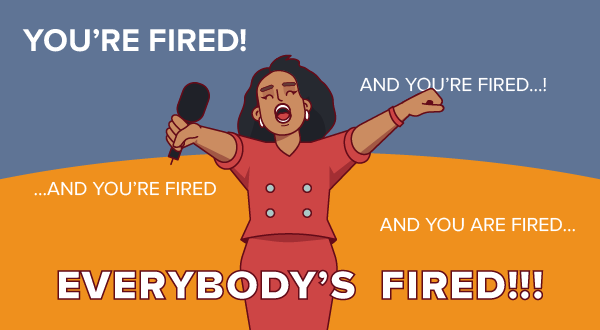Starting over
There are so many reasons folks get a pass, from the friction it takes to replace them to the shockwaves it would potentially send through the organization. But none of it is “because we couldn’t live without them.”

Capital Thinking • Issue #1092 • View online
“I’m looking around and starting to wonder — ‘Would I be better off if I just restarted this whole company with a new staff?’
It just feels like I’m so inundated with bullshit that I’d be 10x better off just starting over.
Is that even a thing?”
-Wil Schroter
What if I Fired Everyone and Started Over?
What would happen if we went straight up nuclear on the staff today?
That’s right — a total hard reset. We burn the whole thing down and start all over again.
We stomp out the politics, throw the dead weight overboard, and wipe the slate clean altogether.
Depending on how our day as a Founder is going, that might sound like our worst nightmare or pure heaven.
But it’s actually a very real question that Founders can and should contemplate, in good times and in bad.
For argument’s sake, let’s say that we were forced to shut down and let everyone go, but then managed to raise some capital to resuscitate the business and had a chance to do it all over again (we actually did this with Zirtual.com when we bought it, so it’s not just mental exercise).
How would we think about our current staff?
What Roles Would We Eliminate?
There’s almost a 0% chance that if we had to do it all over again that we’d create the exact same roles and structure.
That’s not because we weren’t smart about how we did it the first time, it’s because organizations don’t start with the “perfect structure,” they evolve into a structure that hopefully, eventually, kinda, sorta works.
The current roles are often a result of managing individual personalities, moments in time within the business, and legacy duties that we just never really got around to cleaning up.
Said differently, these weren’t always decisions that we opted to make as much as choices that we had to make.
If we had to reset the meter, would we create the exact same roles? Probably not.
We’d likely streamline them where we could or eliminate them where we needed to.
We didn’t, because there are real people in those roles, not just org chart placeholders, but if we had to do it again, that org chart would be a lot tighter.
What Would We Spend?
Knowing now what we do, would we have paid that huge premium for that one developer (not to pick on Devs, you all just get paid the best!) or would we have created that lopsided comp plan for the Biz Dev lead? Probably not.
But at the time we either didn’t have a choice or just didn’t know any better.
But it’s not just a misplaced starting salary.
It’s also a ton of legacy salaries from folks that were paid top dollar when they were the tallest midget in the room, but now are still getting comped like a senior executive even though they are middle managers or line workers, and maybe not even that competent at that.
Would we spend the same? Probably not.
In fact, we could probably save a ton of money simply by having a fresh look at the roles and comp requirements.
We would right size compensation based on what we know the business is, not what we guessed it might be in years passed.
Who Would We Rehire?
Once we figure out what roles we’d keep and what the appropriate comp would be, the only question becomes — who exactly would we rehire?
If we had the opportunity to bring back anyone we wanted, who would get the offer, and who would get the brush off?
This says it all.
If we wouldn’t hire them back, no matter what the role, then we have to wonder how we kept them for so long as it is.
There are so many reasons folks get a pass, from the friction it takes to replace them to the shockwaves it would potentially send through the organization.
But none of it is “because we couldn’t live without them.”

*Featured post photo by Elia Mazzaro on Unsplash
